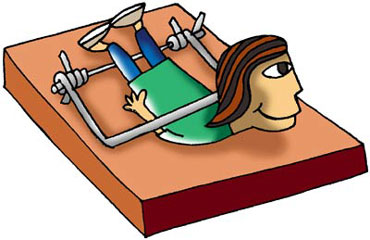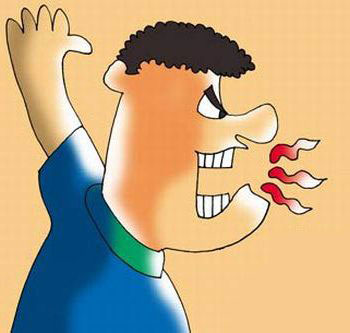Suveen K Sinha
Despite several high-profile cases of sexual harassment, Indian firms largely seem to be in denial. It's time they woke up to reality, but the whole issue is also a lot more complicated than it appears.
In the new advertising campaign of Idea Cellular, the users of its mobile telephone service break the language barrier, using a simple solution offered by a tea vendor.
In the last shot, a poignant one, it is revealed that the tea vendor is speech-impaired. It is ironic, therefore, that the company's executives clammed up every time we approached them in the past four weeks with the question: Why did Pradeep Shrivastava leave the company.
Shrivastava, who was the chief marketing officer and is widely regarded as the brain behind the What an Idea, Sirji campaign, exited on July 22 amid murmurs that he had been accused of sexual harassment by a female colleague 25 years his junior.
Shrivastava, when contacted on his mobile phone, would not go into the reasons for his exit. "It is only right that you talk to the company about it. I have left the company and moved on with my life. If I have a comment to make, I will only make it to the appropriate authorities."
But mention his name and the company's spokespersons, as well as senior executives of the mother ship, the Aditya Birla Group, begin to resemble the tea vendor of their new commercial. They would not even reply to emails or SMSs.
. . .
Sexual harassment at work? Shhhh, it doesn't exist!
Photographs: Uttam Ghosh/Rediff
How the mighty have fallen
Shrivastava is not the first high-flier whose career looks to be in danger of being derailed by a sexual harassment slur.
Phaneesh Murthy was the brightest star at Infosys Technologies, sewing up deals in the all-important US market, when he fell from the sky.
David Davidar, the head of Penguin in Canada, had his wings clipped. Mark Hurd had to leave Hewlett-Packard even though he had dug the company out of the hole in which former CEO Carly Fiorina's ambitious acquisitions had put it.
In such cases, as demonstrated by Infosys in settling the Murthy case out of court by paying some $3 million, it is important for the organisation to show to the world that it deals with such cases in a fair and transparent manner.
"All companies are trying to enroll more and more women on to their workforce. This year, women constitute 34 per cent of the new recruits in our software workforce. There is need for discussion and debate at various levels to ensure that this large per centage of managers and engineers can operate successfully," says N R Narayana Murthy, the company's chief mentor.
. . .
Sexual harassment at work? Shhhh, it doesn't exist!
Photographs: Uttam Ghosh/Rediff
Then there is the all-important question of business. Or, as seen in the case of H-P, market capitalisation. The company's shares plunged 9.3 per cent after Hurd's resignation was announced.
Not everyone agrees, though. As an executive of Idea Cellular confided off the record, it was concluded in prolonged internal discussions that it was possible to snuff the story out by not talking about it.
This executive, when asked for Shrivastava's mobile number, wouldn't email or SMS it; it could only be obtained in hushed whispers on the phone.
To be fair to Idea, its approach is not unique. A large part of corporate India lives under the illusion that sexual harassment does not exist, and certainly not in their company. The executives of an engineering company snigger that no one will try to harass "the kind of women who work with our company."
Industry associations, which are adorned with committees on quality, environment, etc, have little to say when asked if they have set up one to deal with sexual harassment.
. . .
Sexual harassment at work? Shhhh, it doesn't exist!
Photographs: Uttam Ghosh/Rediff
The human resources head of a large consumer goods company swears that no such case has ever come up before him. He is, however, willing to mention snatches of drawing room conversation picked up when his wife's colleagues come visiting and talk about all sorts of misdemeanour in their company.
He is one among several managers who tend to think of sexual harassment in the same way that many others think of accidents: A terrible thing that happens to other people.
Some facts should wake them up. A joint Reuters/Ipsos poll of 12,000 people in 24 countries, released days after Hurd's resignation, said one in 10 workers had been pestered for sex by a senior.
Workers in India were found to be the most likely to report sexual harassment with a report rate of 26 per cent. The National Labour Institute recorded 5,671 reported cases of sexual harassment at the workplace in 1996, which grew to 10,950 in 2007 -- up 93 per cent. This is only the tip of the iceberg, as thousands of cases go unreported. The wolf, as they say, is at the door.
Desperate measures
But why blame companies alone? Two years ago, Nisha Bhatia, an officer in the Research & Analysis Wing, the hallowed RAW, attempted to kill herself by swallowing rat poison in front of the Prime Minister's Office to draw attention to her plight.
. . .
Sexual harassment at work? Shhhh, it doesn't exist!
Photographs: Uttam Ghosh/Rediff
Bhatia said the clutch of men running RAW were blocking her career and making unsavoury remarks about her. When she found no redressal, she had to take the extreme step.
That shook the government into setting up a committee, headed by retired IAS officer and founding director of the National Institute of Fashion Technology, Rathi Vinay Jha, to look into allegations of sexual harassment against secretary-level officers, who comprise the top echelon of the country's bureaucracy.
That was nearly a decade after the Supreme Court, in its Visakha judgment, laid down that all entities must have a structure of committees to deal with sexual harassment. This judgment remains the guiding principle in such cases, since the Bill drafted two and a half years ago to frame a sexual harassment law has faded into oblivion.
"The setting up of the committees after the Supreme Court's Visakha judgment has emboldened women. Earlier, they had no defence. You could complain to your boss, who could himself be the perpetrator. There was also the stigma to deal with," says Jha.
But it isn't nearly enough. As Jha points out in the next breath, the labyrinth of government systems does not allow for rapid justice. "We give our findings. Then it is for the department concerned to take it forward with departmental action, which can take time. We in the committee do not get to know what happens eventually."
. . .
Sexual harassment at work? Shhhh, it doesn't exist!
Photographs: Uttam Ghosh/Rediff
It does not help that in many companies women are expected to act in a certain accommodative way in office as well as outside, especially at parties, which are frequent. Many times women do not know how to react. They feel an initial shock and get immobilised, hardly believing what they have just experienced.
"Just constituting committees does not help. Quite a lot of officers think all this is an uncalled for fuss. The mindset at the top has to change," says Jha. A little bit of speech, even if it does not break the language barrier, won't go amiss either.
What if . . .
"People don't think of sexual harassment as a crime," laments Supreme Court lawyer Pinki Anand. "It has to be treated as a crime, not a pastime which can be condoned by a western approach."
Larry Ellison would differ. The big boss at Oracle put his money where his mouth is in hiring ousted Hewlett-Packard CEO Mark Hurd as co-president.
Not too long ago, H-P had eased Hurd out under the shadow of a sexual harassment charge, which, said Ellison, was the worst personnel decision since Apple's board forced Steve Jobs out 25 years ago.
. . .
Sexual harassment at work? Shhhh, it doesn't exist!
Photographs: Uttam Ghosh/Rediff
Hurd is not the only one to have bounced back from such a slur.
Phaneesh Murthy, who had to leave Infosys six years ago, has spent his time well to build iGate as a reasonably successful company. His reputation as one of the best marketers of India's outsourcing industry continues to grow.
Outside the world of business, supercop K P S Gill continued to get plum jobs despite Rupan Deol Bajaj waging a 17-year battle, a successful one, to get him convicted of having tried to outrage her modesty.
Not everyone, though, has a tennis buddy like Ellison, Murthy's pluck, or Gill's aura. The executives of a large multinational's Indian arm still tut-tut at the mention of a former marketing head, as bright a star as they come, who was felled soon after a not-so-successful actress accused him of acting fresh. What if he was, as many of his former colleagues believe, innocent?
Click NEXT to read how Infosys tackles the issue . . .
Sexual harassment at work? Shhhh, it doesn't exist!
Photographs: Uttam Ghosh/Rediff
How Infosys tackles sexual harassment issues
Infosys chief mentor N R Narayana Murthy talks about the steps Infosys has taken to guard against and deal with sexual harassment issues.
What were the lessons you drew from the Phaneesh Murthy case?
I don't want to talk about an event that is dead and gone. It is not fair to rake it up now. However, I can talk about what we have done so that instances of sexual harassment do not occur in the future.
What are those initiatives?
We have created an adjudicating body called the Grievance Redressal Board. Any individual can complain to this board if he or she has been harassed sexually. This board is headed by a highly-respected person from outside the company.
We got an outsider as chairperson since we wanted to make sure that there was objectivity in our decision-making. This group looks at the relevant data, makes analysis, and comes to a conclusion while guarding the confidentiality of the harassed and the accused.
If there is any truth in it, they will bring it to the attention of the CEO and the board of our company, and recommend suitable action. The CEO implements the recommended action. Punishment is given to the individual if he or she is guilty. We protect the identity of the person harassed and the innocent among the accused.
Secondly, we have created a platform for training every one of our managers in how to conduct themselves with people of other genders, what words they should not use, what gestures they should not make, and what actions they should desist from.
. . .
Sexual harassment at work? Shhhh, it doesn't exist!
Photographs: Uttam Ghosh/Rediff
Thirdly, we have an initiative called IWIN -- Infosys Women Inclusivity Network. I am the sponsor of this. It looks at various aspects of making the life of a working woman at Infosys better in the workplace.
The objective of IWIN is to give our women employees confidence, to make the work environment more hospitable to them, to provide a better work-life balance to them, and to help them become confident and asserting managers.
Is this an issue that needs to be dealt with at the level of industry associations?
It is extremely important for industry associations to discuss and debate this issue because most member-companies are recruiting more and more women on to their workforce.
This year, women constitute 34 per cent of the new recruits in our software workforce -- 8,500 women among 25,000 software recruits. The figure was 33 per cent last year.
Therefore, there is a need for discussion and debate at various levels in the country to ensure that this large percentage of women managers and engineers can operate as independent, confident, happy and productive managers.
. . .
Sexual harassment at work? Shhhh, it doesn't exist!
Photographs: Uttam Ghosh/Rediff
Once a man gets accused, what is the defence mechanism available to him?
We have had cases where the Grievance Redressal Board came to the conclusion that the accusation was false. The board can call for any data, as long as the identities of the accuser and the accused are protected.
They use data and facts to make an in-depth analysis before coming to any conclusion of guilt. It is important that not even one innocent person gets punished.
Once such cases break out, do they affect business?
We are a 114,000-people strong company. There is always a possibility of some violations, say one in 100,000. But, this does not affect the business as long as our employees and customers know that there is a robust, independent, objective and fair process to punish the guilty, and protect the identity of the victim and the innocent among the accused.
Victims should not keep quiet worrying about their career prospects or business prospects for the company. Managers should take appropriate actions without worrying about false complaints.
What we should worry about is whether we are fair to both parties, whether there is confidence among our employees in our redressal system, and whether we are creating an environment where the victim has the courage to complain.












article